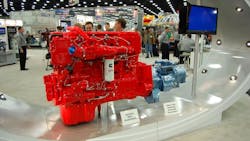NACFE report: Downspeeding can generate 2% to 3% fuel savings
A new confidence report issued by the North American Council for Freight Efficiency (NACFE) this week indicates that downspeeding – the practice of using fast gear ratios that lower the speed of the engine – can cut commercial truck fuel consumption by 2% to 3% because it allows the engine to operate at the most fuel-efficient RPM when generating only the minimal horsepower required under cruise conditions.
NACFE added that downspeeding is now a “primary” powertrain-focused strategy among OEMs to improve fuel economy for both long-haul regional-haul day cab tractors that operate at highway speeds much of the time – largely because complementary technologies make it “more attractive” in heavy-duty truck applications.
The group said it researched nine different downspeeding applications using both proprietary and supplied engine and transmission combinations configured in one of two formats:
- A direct drive transmission and a fast axle ratio. The fast axle ratio direct drive transmission specification is optimal in terms of friction and fuel consumption reduction, but given the potential for driveline failure some manufacturers only approve it for true line haul applications where the highest torque conditions occur infrequently.
- An overdrive transmission and slightly slower rear axle ratios. The somewhat slower axle ratio of an overdrive transmission spec subjects the transmission output, driveshafts, and axles to far less torque. This makes it appropriate for both line haul and regional and city delivery applications.
NACFE suggested that an automatic or automated mechanical transmission (AMT) should be spec’d on any downsped engine. But if a manual transmission is selected, the engine’s torque response during clutch engagement must be specifically tailored to the drivetrain to gain the expected fuel savings.
The group stressed, however, that downsped-configured powertrains can come with higher cost and higher risk of damage
“Downsped axles, being less flexible, are much more sensitive to sudden shocks,” NACFE noted in its report. “The need to spec an automatic or AMT with a higher output torque capability, a certain clutch with a higher capacity damper, and higher torque driveshafts and rear axles leads to greater upfront costs.”
About the Author
Sean Kilcarr
Editor in Chief
Sean Kilcarr is a former longtime FleetOwner senior editor who wrote for the publication from 2000 to 2018. He served as editor-in-chief from 2017 to 2018.
